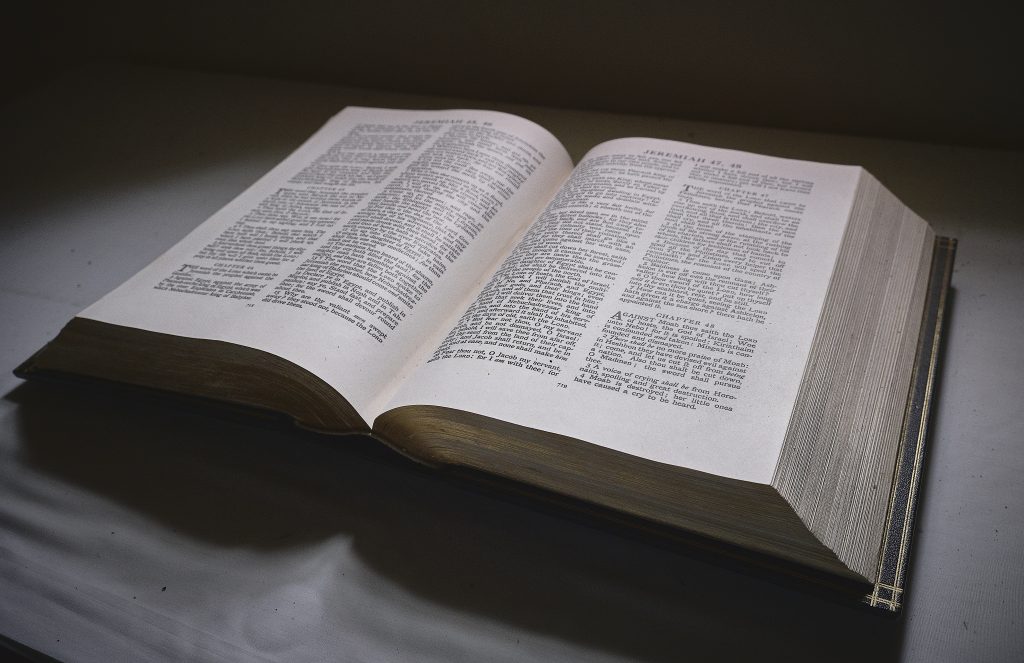
Bob Derrenbacker
19 July 2022
Some Pharisees came to [Jesus], and to test him they asked, “Is it lawful for a man to divorce his wife for any cause?” He answered, “Have you not read that the one who made them at the beginning ‘made them male and female,’ and said, ‘For this reason a man shall leave his father and mother and be joined to his wife, and the two shall become one flesh’? So they are no longer two, but one flesh. Therefore what God has joined together, let no one separate.” They said to him, “Why then did Moses command us to give a certificate of dismissal and to divorce her?” He said to them, “It was because you were so hard-hearted that Moses allowed you to divorce your wives, but from the beginning it was not so. And I say to you, whoever divorces his wife, except for unchastity, and marries another commits adultery.”’
Matthew 19:3-9
One of the things that unites us as Anglicans is our belief that Holy Scripture has a particular authority in our lives and contains “all doctrine necessary for external salvation through faith in Jesus Christ”, as we read in the ordinal in A Prayer Book for Australia. As such, the exegesis, interpretation and application of Holy Scripture is supremely important to us as Anglicans. Our exegesis and interpretation of Scripture needs to be sound and contextual if it is to be properly read and faithfully applied in contemporary life. We also need to be prepared for difference of opinion when we engage in Biblical interpretation, and participate in a healthy and respectful debate in the midst of these differences.
In the recent General Synod debate about same sex marriage, several references were made to Jesus’ teaching on divorce and remarriage in Matthew 19, specifically verses four to six, as an apparently implicit condemnation of same-sex marriage. But I ask, is this an appropriate reading of Matthew 19?
Read more: What we should and shouldn’t tolerate must be determined by God
To understand Matthew 19 more fully, we must first look at Matthew’s source-text for 19:1-12, which is Mark 10:1-12. Without question, the Gospel of Mark is Matthew’s main source for most of his Gospel – nearly 98 per cent of the passages in Mark show up in Matthew.
As a result, much of Jesus’s teaching on divorce and remarriage in that passage of Mark appears in the parallel text in Matthew. For example, in both Matthew and Mark, it is a group of Pharisees that ask whether it is “lawful” for a man to divorce his wife. In both, Jesus makes reference to the provision of a “certificate of dismissal” from Deuteronomy 24:1. In both, Jesus justifies his words on divorce by quoting Genesis 1:27 – “God made them male and female” – and Genesis 2:24 – “Therefore a man leaves his father and his mother and clings to his wife, and they become one flesh”. In both Matthew and Mark, there is a statement from Jesus that a husband who divorces his wife and marries another commits adultery.
Read more: Future of same-sex marriages may be left to individual dioceses
However, there are also some interesting differences between Matthew and Mark. In Mark’s gospel, Jesus’ teaching imagines a secular, Roman legal understanding of marriage and divorce. In Mark 12:11-12 Jesus describes a scenario where either a husband or a wife could legally seek a divorce. In Matthew’s version of the story however, Jesus’ teaching in verse nine seems to only imagine a Jewish legal understanding, where it was only the husband who had the legal right to divorce his wife.
In addition, in Matthew 19:3 (but not Mark) we see the Pharisees ask Jesus the following: “Is it lawful for a man to divorce his wife for any cause?”. The phrase “for any cause” is added by Matthew, and indicates that there Jesus is being asked to settle a debate between competing factions of Pharisees about the legitimacy of divorce. In other words, Jesus is being asked to take a position on “any cause” divorce – divorce for “any cause,” or any reason, was a position that Hillel school of Pharisees advocated. This scenario, scholars argue, would have left divorced wives in Jewish antiquity incredibly vulnerable, without any legal rights and the life-preserving protection of an ancient household. It allowed the husband to divorce his wife for “any cause,” with the wife not possessing the same legal right.
The Shammai school of Pharisees advocated a much more restrictive understanding of divorce, sanctioning it only for a few, narrow reasons such as certain types of sexual immorality. As well, only in Matthew do we see an exception given by Jesus for situations in which divorce initiated by a husband and remarriage was acceptable – porneia, what the NRSV translates as “unchastity” in Matthew 19:9.
Thus in Matthew and only in Matthew, Jesus is essentially being asked to settle a debate among two groups of Pharisees as to whether “any cause” divorce is appropriate. Jesus responds by taking a fairly hard line against “any cause” divorce, arguing in verse six that an indissoluble marriage is God’s ideal, but in verses seven to eight that the law of Moses allows for a husband to divorce his wife. Jesus appeals to Genesis 2:24 in his response to argue against the Hillel position of “any cause” divorce and justify the indissolubility of marriage with very few exceptions. Thus, if Matthew 19 has anything to say to contemporary life, it is perhaps about Jesus’s fairly strong condemnation of divorce, Jesus’s affirmation of the permanence and ideal indissolubility of marriage. It is not about an apparently implicit condemnation of same-sex marriage.
Our goal as Anglican readers and interpreters of Holy Scripture is to engage in the process of reading and interpretation prayerfully, communally, and faithfully. To be faithful readers of Scripture we need to be faithful to a passage’s cultural, historical, and theological contexts. In doing so, our exegesis and interpretation will hopefully be more sound and orthodox, and will then be able to more effectively speak into to those places and times where we find ourselves in theological disagreement as Anglicans.
The Reverend Canon Dr Bob Derrenbacker is dean and Frank Woods Associate Professor in New Testament at Trinity College Theological School.
For more faith news, follow The Melbourne Anglican on Facebook, Twitter, or subscribe to our weekly emails.






